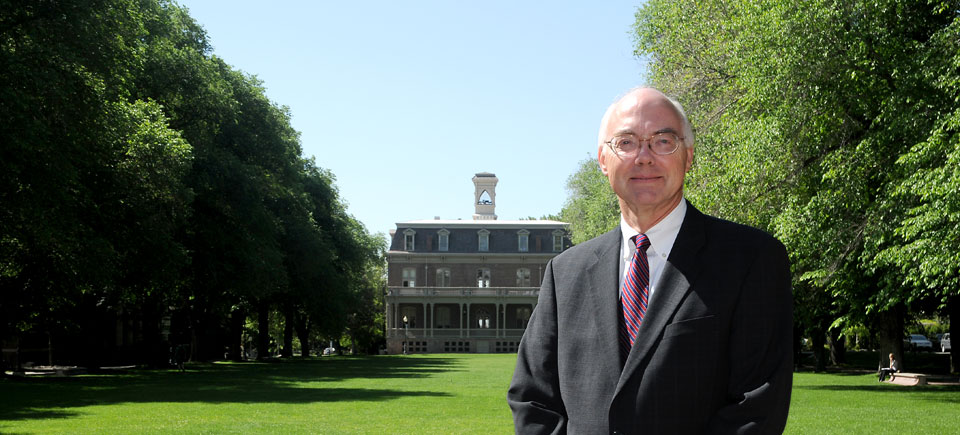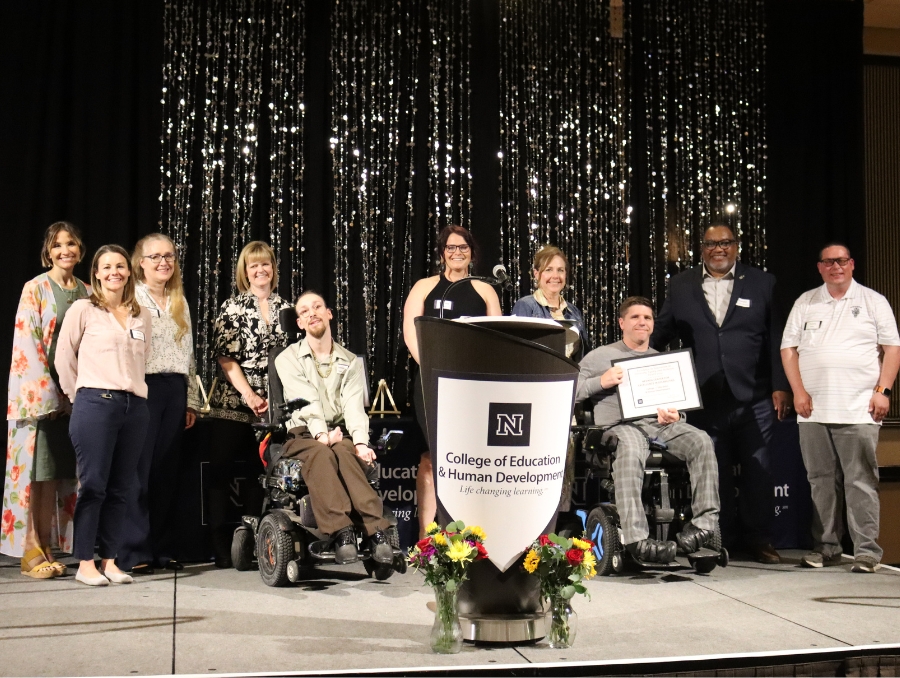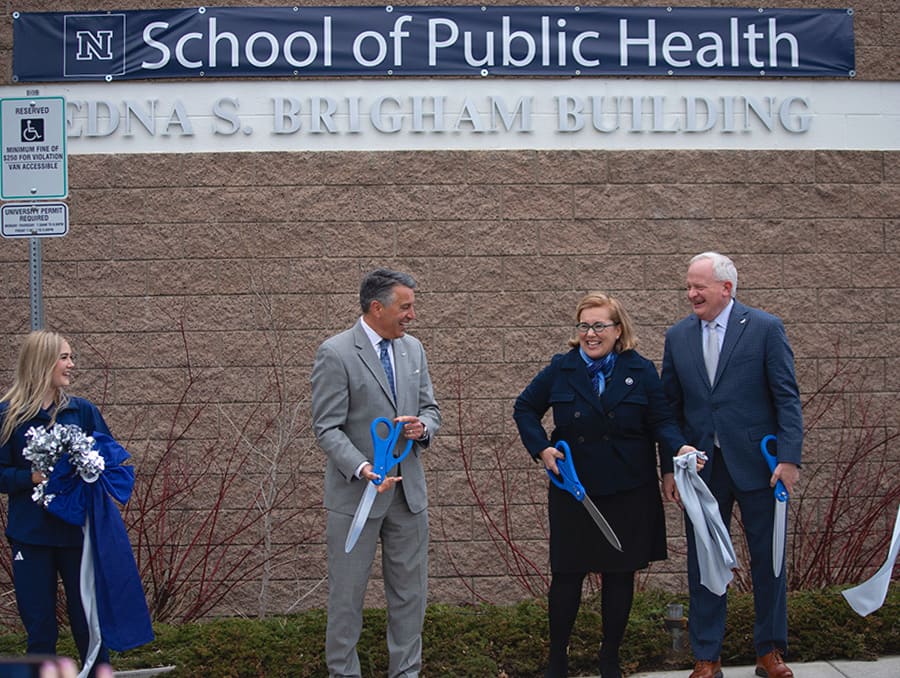
Marc Johnson was appointed as the University's 16th president by the Board of Regents.
Marc Johnson was named the 16th president of the University of Nevada, Reno by a vote of the Nevada Board of Regents on Friday, April 20, in a meeting in Las Vegas.
"I will give you my tireless effort to continue the momentum that this University has made," Johnson told the Regents upon learning of their decision, adding that he would work equally tirelessly in fulfilling the mission of the Nevada System of Higher Education's mission, which includes eight member institutions. "We'll make you proud."
Johnson has served as the University's interim president since the death of University President Milt Glick in April 2011.
Later, when asked to reflect on what the decision meant to him, Johnson added, "It is a high honor to have been given this opportunity. I'm very gratified by the community and campus support of my candidacy.
"We are a quality university with a statewide obligation and presence, and we will continue to communicate with our constituents statewide to better convey what the University represents and how it contributes to Nevada's future. We will continue to grow the University's national reputation and remain committed to being a University with hands-on learning opportunities that prepares students with the knowledge and skills to be contributing, successful citizens."
In discussing Johnson's appointment, members of the Board praised Johnson's work. Before serving as interim president for the past year, Johnson had been provost and executive vice president at the University since 2008.
"The best president I've ever seen at the University of Nevada, Reno was Joe Crowley," said Board of Regents Chair Jason Geddes, himself a former University student body president and referring to University President Emeritus Joe Crowley, who served from 1978-2000 and is considered by many to be the University's finest chief executive. "When we got through the interview process, Marc Johnson was my Joe Crowley."
Regent Michael Wixom cited the broad-based support of Johnson as one of the deciding factors in his belief that Johnson was the best choice for the University.
"Listening to the community and the campus, Dr. Johnson was my unqualified choice," Wixom said.
Regent Rick Trachok, a University graduate, said it was his belief that during candidate interviews held on campus on Wednesday, April 18, "Dr. Johnson hit the ball out of the park ... He is somebody who has a vision, who is a constant presence in the community, someone who can take a traumatized institution and keep it moving on its upward trajectory."
Johnson had described himself as "not very flashy" during his interview on Wednesday.
Trachok said flashiness and effectiveness are sometimes confused.
"He says that he's not very flashy," Trachok said of Johnson. "I take that as a positive. He is who he is."
During public comment prior to the Regents' decision, several individuals from both northern and southern Nevada expressed their admiration for Johnson's ability to help heal the institution following four years of budget cuts, the tragic loss of a leader and to instill a sense of vision for the University's future.
"I do have a decent idea of what it takes to be a successful president," Crowley said during the public comment portion of the meeting, noting that he had been associated with the University for 46 years and had served as president for "almost 24 years" - the longest term of any University president in the institution's 138-year history.
"I can tell you Marc Johnson is absolutely the right choice for this institution at this most critical time," Crowley said.
"He's gotten involved with the community," Reno Mayor Bob Cashell said of Johnson. "He tells us what's going on at the University, and that really helps us stay in tune with what's going on. We really need the leadership of Dr. Johnson."
Psychology Professor William Follette, a former chair of the Faculty Senate, noted that thanks to Johnson's leadership, "The University is getting better at an amazing rate on all metrics."
Follette said that these include all-time institutional highs in retention, diversity, the number of National Merit Scholars on campus, research, the University's ranking among the top 100 public universities in the country as well as recent achievements in donor support and innovation. Follette said that in recent days the University had received word that it had received a $10 million federally funded COBRE biomedical excellence grant.
"And where else does Marc Johnson wear well?" Follette said, noting that the University had recently received more than $6 million in two separate donations. "It seems he wears well with donors."
English professor Stacy Burton listed vision, strength to make difficult decisions in a humane manner and integrity as Johnson's overriding strengths.
"He hasn't simply kept the ship afloat," she said. "Far from it. He has kept the University moving forward."
In accepting the role, Johnson expressed his commitment to sustain the University's momentum. In the past year the University has achieved its highest-ever enrollment, number of graduates, number of students of color and graduation rate. The University maintained its top tier ranking among the "nation's best universities" by U.S. News and World Report, and this year was ranked among the top 100 public universities.
Since being appointed president on an interim basis, Johnson established the University's Office of Diversity Initiatives and has represented the University in the upcoming move to the Mountain West Conference. The two significant gifts referenced by Follette were a $5 million gift from Phil and Jennifer Satre to benefit the School of Medicine, College of Education and athletics, and $1.6 million from the Redfield Foundation to benefit the School of Medicine.
"We've come through some challenging times, but there is a spirit and resiliency about this University that has carried us through," said Johnson. "It has been immensely rewarding to see the commitment of our faculty, staff and friends, and the strong desire to support our future generations and improve the quality of this institution and, ultimately, the health and economic well-being of Nevada."
Friday's meeting was held at the Desert Research Institute in Las Vegas. Johnson was recommended as the finalist candidate by the Regents' Presidential Search Committee on April 18. The decision of the committee of six regents was made with input from an Institutional Advisory Committee consisting of 11 representatives of the community and 12 representatives of University faculty, staff and students. A series of forums was also held to allow faculty, staff, students and the community the opportunity to meet with Johnson and the two other candidates.
"The passion for and interest in the University of Nevada, Reno and its future are clear," Regent James Dean Leavitt, chair of the Regents' Presidential Search Committee, said of the level of involvement. "In particular, I appreciate the time and thoughtful input contributed by the members of the Institutional Advisory Committee. The recommendation of our search committee was better informed because of this broad-based involvement."
"Dr. Johnson is very honest and very straightforward," said Erik Williams, chairman of the University's Staff Employees Council. "He has really garnered our respect. He saw this University through changes and challenges, and did so with integrity."
Former ASUN President Casey Stiteler said Johnson, from the perspective of the University's students, was the right choice.
"We seemed to discuss Dr. Johnson as the ‘safe' or ‘comfortable' choice," said Stiteler, who served on the Institutional Advisory Committee during the search. "(The University's students) see Dr. Johnson as the exciting choice. We're all very excited to see what he's able to do and where he will be able to take us as times get better."
"I am happy to see President Johnson's good work rewarded by the Board of Regents and look forward to working with him to grow this University in the future," said David Ryfe, faculty member and chairman of the Faculty Senate.
Johnson joined the University of Nevada, Reno as executive vice president and provost in 2008. As provost, often described as a university's chief academic officer, Johnson led the development of the University's Strategic Plan in 2009, which provides an operational blueprint through 2015 and incorporates input from individuals and divisions from across the University.
Johnson was raised and employed on his family's fruit farm near Wichita, Kan., and began his career as a laboratory and instructional assistant at the Kansas State Teachers College. As his career in higher education progressed, Johnson served several notable land-grant universities.
Prior to coming to the University, Johnson was dean of the College of Agricultural Sciences at Colorado State University (CSU). He joined CSU in 2003 as vice provost for agriculture and outreach and dean of the College of Agricultural Sciences, and also served as interim director of Colorado Cooperative Extension and interim state forester of Colorado State Forest Service, both hosted through CSU.
From 1992 to 2003, Johnson was dean of the Kansas State University College of Agriculture and director of the Kansas Agricultural Experiment Station and Cooperative Extension Service. Prior to that he was a member of the faculty at Oklahoma State University and served in faculty and administrative roles at North Carolina State University.
Johnson received his bachelor's degree in biology from Emporia State University in Kansas, which named him a Distinguished Alumnus in 1994. His advanced degrees include a master of technology in international development from North Carolina State University, a master of economics from Michigan State University and a doctorate of agriculture economics from Michigan State University. Johnson's research and teaching have been based in economics, with an emphasis on national and international food distribution systems.












